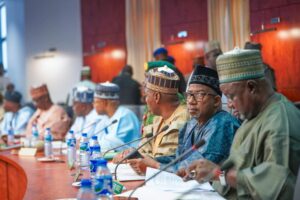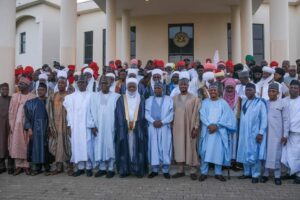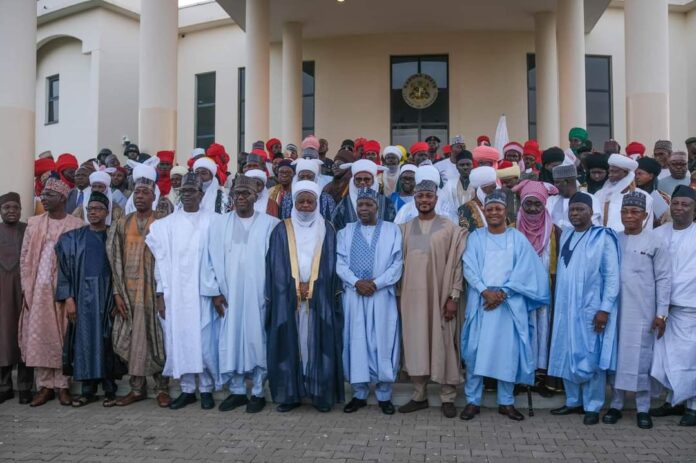By; Mohammed Kawu, Bauchi
Chairmen of Northern Councils of Emirs and Chiefs, and the Northern States Governors Forum have vehemently and unanimously rejected the proposed Tax Amendments, and called on members of National Assembly to oppose any bill that can jeopardize the well-being of their people.

The two regional bodies in a communiqué after their meeting Monday, noted with dismay the contents of the recent Tax Reform Bill that was forwarded to the National Assembly which, they argued, is a blare against the interests of the north and other sub-nationals especially the proposed amendment to the distribution of Value Added Tax (VAT) to Derivation-based Model.
They explained that companies remit VAT using location of their headquarters and tax office and not where the services and goods are consumed, and therefore called for equity and farness in the implementation of all national policies and programmes to ensure that no geopolitical zone is short-changed or marginalized.

The Northern Governors and Emirs
further noted the present economic hardship affecting the country, and appealed to all citizens to remain calm as, according to the communiqué, States and Federal Government are working hard to implement measures that will cushion effects of the hardships.
The communiqué signed by the Chairman of the Northern Governors Forum, and Governor of Gombe state, Muhammadu Inuwa Yahaya, said however that the Northern Governors and Emirs, as well as their people are not averse to any policies or programmes that will ensure the growth and development of the country.

Forum agreed that Northern Nigeria holds immense agricultural potentials which, if fully harnessed, can significantly alleviate hunger and boost economic growth, as the meeting also resolved for the provision of adequate support to the farmers, including access to financing, modern farming techniques and infrastructure such as roads and irrigation systems.
Communiqué held the view that agriculture should not only be seen as a means to feed the Northerners, but also as a catalyst for industrialization and job creation across the region, saying this can be achieved through re-industrialisation of the North especially by reviving the textile value chain and development of other agro-allied industries.

It commended His Excellency, the President and Commander-In-Chief of the Armed Forces of the Federal Republic of Nigeria for the reform initiative in the livestock sub-sector and agreed to provide the necessary political will and commitment to ensure the success of the Federal Government livestock development initiatives.
The Forum members comprising governors, emirs, chiefs, and security chiefs, among others further agreed to sustain engagement and cross-fertilization of ideas with the Presidential Livestock Reforms Implementation Committee to achieve greater results.
They also acknowledged the fact that climate change has greatly affected the environment resulting in the recent flood incidents in many parts of the North and therefore resolved to partner with the Federal Government and other stakeholders to build irrigation infrastructure like canals and waterways to divert excess water and channel them towards irrigation activities, thus enhancing rural livelihoods and safeguarding food security.
To this end, the forum extended its deepest sympathies to the victims of the recent flood disasters in Maiduguri and other parts of the North, as well as to the families affected by the tragic tanker explosion in Jigawa State, as it also commiserated with other victims of terrorism, banditry and similar criminal activities in the North and Nigeria at large and stand in solidarity with them during these difficult times.
Forum however emphasized that traditional institutions are critical in the quest for lasting peace and security in the region, and acknowledged their commitment in bridging the gap between the Government and the people, as it also advocated for increased roles for the traditional institutions to maximize cooperation with security agencies in the fight against kidnap for ransom, banditry, cattle rustling, communal clashes, farmers/herder clashes and other forms of criminality.
Communiqué further acknowledged the recent gains made against criminals, especially the elimination of bandits and terror leaders, and resolved to sustain these gains in order to ensure lasting peace and stability in the sub-region.
It commended the Federal Government and security agencies for their commitment in ensuring that Nigerian communities are safe and secure, and commended particularly the untiring commitment of the Chief of Defence Staff, General C. J Musa whose professionalism and innovative approach has made difference in security architecture of the country at large.
The joint meeting which deliberated extensively on matters of common interests, was earlier briefed on the security challenges in the north by the Chief of Defence Staff, General Christopher Musa, called on the Federal Government and relevant agencies to urgently address the current electricity power blackout affecting most of the Northern states due to vandalization of electricity transmission infrastructure.
Meeting participants argued that this matter not only underscores the vulnerability of critical infrastructure, but also the need to build additional transmission lines and diversify the energy supply so as to better connect the region and improve its energy resilience.
They recalled the recent “End Bad Governance” protests that took place in August, and resolved to scale up efforts to tackle the root causes of youth restiveness by investing in education, skills development, job creation and pathways for the youth to chanel their energy into productive ventures, thereby reducing their vulnerability to crime and social vices.




